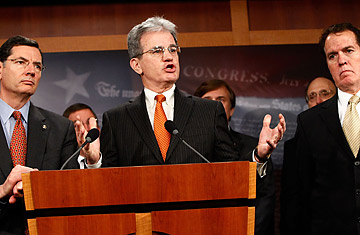
From left, Senator John Barrasso (R., Wyo.), Senator Tom Coburn (R., Okla.) and Representative Phil Gingry (R., Ga.)
In the wake of their health care defeat, Republicans in Washington would be wise to remember one famous definition of insanity as repeating the same behavior again and again but expecting different results. After all, there's hardly a politico in Washington, Republican or Democrat, who thinks Senator Jim Bunning's one-man filibuster of unemployment benefits last month reflected well on the GOP. So why are Senate Republicans doing it again?
Granted, this time around the agitator is the much more media-friendly Republican Senator from Oklahoma, Tom Coburn, who — unlike Bunning — is not known for flipping off reporters. Before the Senate adjourns for a two-week Easter recess on Friday, Democrats are hoping to pass another one-month extension of benefits — the yearlong extension has been held up as differences are worked out with the House — to tide over the unemployed until lawmakers can pass a more permanent solution. Coburn's objection is the same as Bunning's: that Democrats are not paying for the $10 billion bill. "I think it's unfortunate that potentially we may go home and not deal with it," Coburn said Thursday afternoon in a speech on the Senate floor. "I don't care how we pay for it as long as it's legitimate, as long as we don't add to our kids' debt. And so I'm open and willing to negotiate on any area of waste in the federal government that we could eliminate to pay for it."
Democrats say that they consider this bill along the lines of (and much cheaper than) President George W. Bush's emergency war supplemental bills, which totaled trillions of dollars and were mostly unpaid for. "We really believe that unemployment situation is an emergency economic situation," Senator Dick Durbin of Illinois, the No. 2 Senate Democrat, told reporters Thursday evening. "The Republicans do not accept that they want to cut off unemployment benefits or pay for it using stimulus funds which are being used to create jobs. It's a very shortsighted approach."
Republican leaders have not totally dug in their heels. They have actually agreed to proceed with a vote on the unfunded bill — but most Republicans are expected to vote against the bill, and Dems will need at least one Republican to reach the magic threshold of 60 to overcome Coburn's filibuster and pass the bill. Even if they managed that, however, it'll take at least until Sunday evening to procedurally bypass the filibuster, and many Senators are impatient to go home or depart on long-planned trips abroad (the security for which is expensive to rearrange).
So, while Reid and Coburn are trying to hash out an agreement — Bunning eventually settled for a vote on an amendment that would have paid for the bill using unused stimulus funds, which failed — other Senators are looking at leaving and then passing legislation when they reconvene April 12. "Whatever we do will be retroactive if we don't get it done now," Senator Debbie Stabenow, a Michigan Democrat, told reporters.
The problem with this solution is that some benefits start to expire April 5. And as the country learned the last time these provisions ran out last month during Bunning's filibuster, that means thousands of Transportation Department workers getting laid off, gaps in unemployment and health coverage for some of the most desperate Americans and bureaucratic nightmares costing millions of dollars for the necessary paperwork to retroactively apply benefits.
Bunning and Coburn both make a valid point: it is hypocritical of Dems to not practice what they preach on the deficit, and this would be the fifth unpaid bill to pass thus far this year. But making the point on the backs of the most needy is probably the wrong way to go about it. Especially when it underscores Democrats' complaints about GOP obstructionism on even the most pressing of issues. "I think Americans — a majority of whom have someone in their orbit out of work — are not very receptive to the idea of cutting off unemployment benefits in the midst of a bad economy," said Norm Ornstein, a congressional scholar at the conservative American Enterprise Institute. "This strategy is not a winner."
